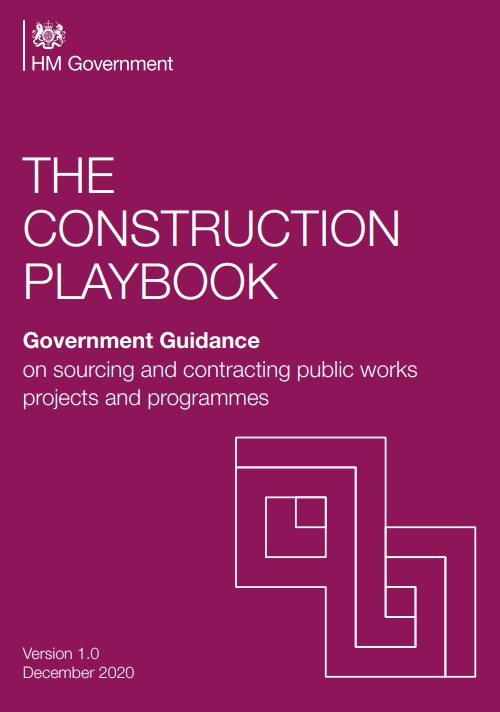The Construction Playbook 1.0 2020
Note: The Construction Playbook was updated in 2022. See: The Construction Playbook 1.1 2022.
Contents |
[edit] Update
An update of the The Construction Playbook was published in September 2022, for more information visit The Construction Playbook 2022 edition.
[edit] Introduction
The Construction Playbook, published on 8 December 2020, sets out plans for how the Government will work with the construction sector to ensure public sector works are delivered faster, better and greener.
The document outlines how the Government will strengthen the financial assessment of all the suppliers it works with to make sure projects are delivered on time and to budget. It also looks to improve productivity and innovation in the sector.
The Construction Playbook is based on discussions between the Government and the construction sector. As a result of this collaborative process, measures in the Playbook have been backed by construction firms and business associations from across the industry.
[edit] Plans for public works
In 2018, construction contributed some £117 billion to the UK economy, as well as supporting over two million jobs. The Construction Playbook indicates what the Government expects from these public projects - ranging from new roads and railway lines to schools, hospitals and prisons.
The Playbook also outlines the key role the construction sector will play in both the UK’s recovery from the COVID-19 pandemic and the country's efforts to bring greenhouse gas emissions down to net zero by 2050. Green initiatives in the Playbook include promoting the use of carbon assessments to understand and minimise the greenhouse emissions of projects.
[edit] Additional guidance
Other specific measures include:
- Providing greater certainty to industry through long-term plans for key programmes. This will include longer term contracting across a range of areas which will give industry the certainty required to invest in new technologies, delivering improved productivity and efficiency savings.
- Encouraging industry to innovate by focusing on the output of project achievements, rather than by micromanaging how it is accomplished.
- Modernising construction by standardising designs and parts, as well as embedding digital technologies including the UK Building Information Management Framework.
- Placing greater focus on developing positive relationships with robust contract management between project leads and industry.
- Investing more in training and apprenticeships, driving forward innovation in construction, boosting productivity and focussing on value for money in public sector developments.
Learning lessons from the Grenfell Tower fire, the Construction Playbook also makes it clear that the construction sector must put safety at the heart of everything it does.
[edit] Initial reactions
Cabinet Office Minister Lord Agnew, said:
'As the largest construction sector customer, the Government is in an ideal position to ensure that the industry is productive, professional and delivers value for money for taxpayers. By adopting the new Construction Playbook, developed with industry partners, we will help ensure that the sector becomes greener and more innovative.'
Andy Mitchell, the CEO of Tideway and Co-Chair of Construction Leadership Council:
'The Government can influence the whole direction that our sector takes with the way it buys new public buildings and infrastructure.
'The Construction Leadership Council is delighted that the Government is showing real leadership in this regard. The Construction Playbook commits us all to drive positive change with better, long-term relationships and more efficient ways of working. The CLC will give its support to engage the industry to play its part in embedding the Playbook recommendations across our sector.'
[edit] Related articles on Designing Buildings
- Consultancy playbook.
- Coronavirus and the construction industry.
- Covid-19 and the new normal for infrastructure systems - next steps.
- Government Skills and Curriculum Unit GSCU.
- Independent review of construction frameworks.
- Management Consultancy Framework MCF.
- National Retrofit Strategy NRS.
- Pre-qualification standard 2021.
- Procurement Policy Note 12/15.
- Procurement policy note PPN.
- Public project: construction.
- Sourcing playbook.
- Standardisation in the construction industry.
- The Construction Playbook 1.1 2022.
[edit] External resources
- Gov.uk, The Construction Playbook.
Featured articles and news
A case study and a warning to would-be developers
Creating four dwellings for people to come home to... after half a century of doing this job, why, oh why, is it so difficult?
Reform of the fire engineering profession
Fire Engineers Advisory Panel: Authoritative Statement, reactions and next steps.
Restoration and renewal of the Palace of Westminster
A complex project of cultural significance from full decant to EMI, opportunities and a potential a way forward.
Apprenticeships and the responsibility we share
Perspectives from the CIOB President as National Apprentice Week comes to a close.
The first line of defence against rain, wind and snow.
Building Safety recap January, 2026
What we missed at the end of last year, and at the start of this...
National Apprenticeship Week 2026, 9-15 Feb
Shining a light on the positive impacts for businesses, their apprentices and the wider economy alike.
Applications and benefits of acoustic flooring
From commercial to retail.
From solid to sprung and ribbed to raised.
Strengthening industry collaboration in Hong Kong
Hong Kong Institute of Construction and The Chartered Institute of Building sign Memorandum of Understanding.
A detailed description from the experts at Cornish Lime.
IHBC planning for growth with corporate plan development
Grow with the Institute by volunteering and CP25 consultation.
Connecting ambition and action for designers and specifiers.
Electrical skills gap deepens as apprenticeship starts fall despite surging demand says ECA.
Built environment bodies deepen joint action on EDI
B.E.Inclusive initiative agree next phase of joint equity, diversity and inclusion (EDI) action plan.
Recognising culture as key to sustainable economic growth
Creative UK Provocation paper: Culture as Growth Infrastructure.
Futurebuild and UK Construction Week London Unite
Creating the UK’s Built Environment Super Event and over 25 other key partnerships.
Welsh and Scottish 2026 elections
Manifestos for the built environment for upcoming same May day elections.
Advancing BIM education with a competency framework
“We don’t need people who can just draw in 3D. We need people who can think in data.”

























